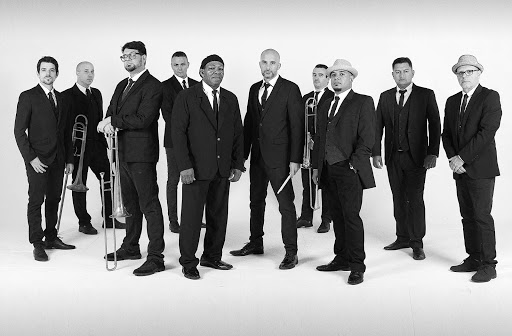Who would have thought, in this decade when Reggaeton and Bachata rule the dancefloor, that a Spanish-based salsa band with a throw back sound of 60s and 70s NewYork, could become a global sensation? But Tromboranga has defied the laws of commercial success, with the thrill of trombones, strong percussion and vocal improvisation combined with, as The LUKAS judges put it, “great storytelling through interesting lyrics.” It was both popular votes and judges’ approval that won the band two LUKAS, best Salsa band and best Album. The judges were impressed by the band’s high quality “Salsa Dura, and its ability to influence Latin dance” and the sound both confident and commercial, thus growing the audience of the Salsa music genre at a time when most labels are focused on Latin Urban genre.
LatinoLife: Being Venezuelan, is Salsa music something you always liked as a child or was it something you grew to love as you got older?
Joaquin Arteaga: One of the first pieces of music I remember hearing was when I was 6 years old in my Grandmother’s house, hearing the bass and trombones of La Dimension Latina playing at a party next to our house. For me it was the first thing I remember hearing I have always loved the conga - its a beautiful instrument. I loved salsa when I was a child but throughout my life I’ve also toured with reggae and rock bands. I feel lucky to have experienced a lot of diverse music - it helps me understand my own genre more. It’s like how the more you travel, the more you know how the world is and also how your own country is.
LL: Could you tell us a little bit about how the group first formed?
JA: I arrived in Barcelona from Venezuela twenty years ago, and after ten years I met Vladimir, who our trombone player, and I told him, ‘Listen I want to do this band and I have these songs’, and he was up for it. I’ve always wanted to have a trombone orchestra, but I never had had the people to do it here in Barcelona. I was producing a Bloque 53 album but I had a few days free in the recording studio so I used them to record ‘Agua que va caer’, ‘Humildad’ and ‘Conmigo Te Quedaras’, which was the EP.
It was just supposed to be a demo, but the DJs started playing it and then just two weeks after we had been recording, people started asking, ‘Who’s that?’. Everyone started calling for concerts and so we had to do the first album, and then the first album sold a lot - I was amazed - and then people started asking for more music and we started recording every year. It was kind of like an explosion.
LL: How would you describe your role in the group?
JA: Well it’s hard for me to say because I’m the father of the band, it was my idea and ambition to have a band like this. I’m also the director, the manager and the publicist! I write, lets say, 80 per cent of the songs. We are independent, we don’t have a production company behind. It’s just ourselves doing it. That’s basically how it works.
LL: Does that give you more artistic freedom?
JA: Absolutely, because every time we jump in the studio, we can keep our concept how we want it. We keep things very raw in the studio. I don’t like to use autotune on the voices and I think that helped us become popular because it’s me speaking, its my personality. We don’t do the music for sales, which is one of the reasons why we record every year because I love to record, if I could I’d be recording an album every month.
LL: You describe your sound as salsa dura - could you describe this?
JA: That’s a good question because - this could be a very long answer so I will try and keep it short (laughing) - salsa dura for us in Venezuela and Colombia means salsa that’s raw, like what we are doing. That means that it can’t have any ‘makeup’, it cannot be done electronically. Salsa isn’t just about dancing, it’s also about dancing to a message - which for me is really important.
LL: I hear that Oscar Hernandez is a fan of Tromboranga, and you ended up working with him, how did that come about?
JA: Two albums ago Oscar wrote to me saying, ‘Hey man, congratulations, I heard the new album. It’s amazing, you’re doing a good job.’ I was like, wow, how is Oscar Hernandez saying this about Tromboranga! So I had this song ‘Sal de la Cueva’, which was originally written for Bloque 53 but we never recorded it. I called Oscar and I told him, ‘Listen, i’ve always been a fan of Seis del Solar, and I’m a total fan of Spanish Harlem (laughs). This song is written with a vibraphone but I want to do it with a trombone, and I want to create the sound that you had with Seis del Solar.’ And he was like ‘Yeah man of course! Send it over and I’ll check it out’ He was very open, he was very helpful. I mean he’s an amazing musician who’s been around for decades - he doesn’t need to talk to me (laughs). So in four days he had the arrangement for ‘Sal de la Cueva' that you can hear on the new album. It’s a mambo, Latin jazz - no lyrics, only music, and I love it. I mean it’s not an easy song to play live but it’s been great working with this big star from salsa.
LL: Of all the songs you’ve made which is your favourite?
JA: Wow, that’s a very hard question to answer (laughs). I have to say that there are seasons where I like some songs, and then the other half of the year I start liking other ones - but it’s very hard to say. In this new album I love playing ‘Casilda Condumi’ which is about the history of a female slave in Colombia who freed a lot of towns. People don’t talk about this part of history enough and I think it’s really important: there were lots of very strong women who took part in the freedom movement of slavery in Colombia.
LL: How much of your sound when you’re recording or live is improvised?
JA: Good question. Normally, when we’re recording I fight a lot with the musicians because - and they’re going to kill me for saying this - a lot of the musicians in Tromboranga love to rehearse and get the music perfect before recording it, but I like to keep a little bit of the improvisation in the recording session. I want like 30% of the album to be improvised, otherwise it’s too robotic and cold. Sometimes, when we are performing live, Diego, who is an amazing Cuban sonero, completely improvises and sings about the people in the audience and mixes it with what the song is about. I actually met him originally at a Bloque 53 concert, he just jumped onstage and started improvising!
LL: So does that mean every show is different then?
JA: Yeah, yeah, every show is different. I mean we have certain points of the show which we always do kind of the same because we play the same songs - but in some parts you never know what’s going to happen in that song. If something comes up and its working very well we just go for it. To play like that is exciting, but it’s also very hard.
LL: Luckily, before lockdown you managed to get a world tour in. What was that like?
JA: It’s been amazing, we’ve been almost everywhere: Australia, South America, all around the USA. Next year we will probably go to Africa for the first time. It’s amazing for us because a lot of stuff, especially on this album, comes from meeting people on tour - hearing other people’s stories. It’s surprising but especially in Asia people really like salsa dancing and the people who like the music only are crazy fanatics - freaks about salsa! It’s been great going to places like Japan and hearing people sing your songs - in Spanish! It’s very weird (laughs). They love salsa there, it’s not just for the weekend they do it everyday. In Taiwan our show was packed - we couldn’t believe how many people were there. It was amazing!
LL: Do you salsa dance? Or do you just stick to the music?
JA: (Laughs) Oh yeah I love to dance! Since Tromboranga we have to travel almost every weekend and so I don’t go out to dance anymore - now I have kids it’s different - but I used to go out to dance. I’m not a dance freak like learning all the steps and turns but I totally love to dance. So normally when I go to a concert if I have the opportunity I will dance a bit. Actually we even dance onstage, I make all the Tromboranga musicians dance - that’s a requisite to get into the band!



















